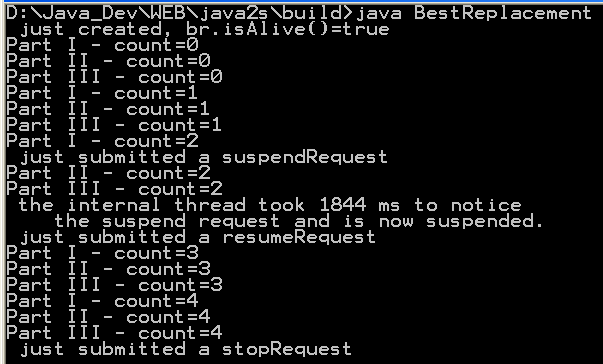Boolean lock

public class BestReplacement extends Object {
private Thread internalThread;
private volatile boolean stopRequested;
private BooleanLock suspendRequested;
private BooleanLock internalThreadSuspended;
public BestReplacement() {
stopRequested = false;
suspendRequested = new BooleanLock(false);
internalThreadSuspended = new BooleanLock(false);
Runnable r = new Runnable() {
public void run() {
try {
runWork();
} catch (Exception x) {
x.printStackTrace();
}
}
};
internalThread = new Thread(r);
internalThread.start();
}
private void runWork() {
int count = 0;
while (!stopRequested) {
try {
waitWhileSuspended();
} catch (InterruptedException x) {
Thread.currentThread().interrupt();
continue;
}
System.out.println("Part I - count=" + count);
try {
Thread.sleep(1000);
} catch (InterruptedException x) {
Thread.currentThread().interrupt();
}
System.out.println("Part II - count=" + count);
try {
Thread.sleep(1000);
} catch (InterruptedException x) {
Thread.currentThread().interrupt();
}
System.out.println("Part III - count=" + count);
count++;
}
}
private void waitWhileSuspended() throws InterruptedException {
synchronized (suspendRequested) {
if (suspendRequested.isTrue()) {
try {
internalThreadSuspended.setValue(true);
suspendRequested.waitUntilFalse(0);
} finally {
internalThreadSuspended.setValue(false);
}
}
}
}
public void suspendRequest() {
suspendRequested.setValue(true);
}
public void resumeRequest() {
suspendRequested.setValue(false);
}
public boolean waitForActualSuspension(long msTimeout)
throws InterruptedException {
return internalThreadSuspended.waitUntilTrue(msTimeout);
}
public void stopRequest() {
stopRequested = true;
internalThread.interrupt();
}
public boolean isAlive() {
return internalThread.isAlive();
}
public static void main(String[] args) {
try {
BestReplacement br = new BestReplacement();
System.out
.println(" just created, br.isAlive()=" + br.isAlive());
Thread.sleep(4200);
long startTime = System.currentTimeMillis();
br.suspendRequest();
System.out.println(" just submitted a suspendRequest");
boolean suspensionTookEffect = br.waitForActualSuspension(10000);
long stopTime = System.currentTimeMillis();
if (suspensionTookEffect) {
System.out.println(" the internal thread took "
+ (stopTime - startTime) + " ms to notice "
+ "\n the suspend request and is now "
+ "suspended.");
} else {
System.out.println(" the internal thread did not notice "
+ "the suspend request " + "\n within 10 seconds.");
}
Thread.sleep(5000);
br.resumeRequest();
System.out.println("Submitted a resumeRequest");
Thread.sleep(2200);
br.stopRequest();
System.out.println("Submitted a stopRequest");
} catch (InterruptedException x) {
// ignore
}
}
}
class BooleanLock extends Object {
private boolean value;
public BooleanLock(boolean initialValue) {
value = initialValue;
}
public BooleanLock() {
this(false);
}
public synchronized void setValue(boolean newValue) {
if ( newValue != value ) {
value = newValue;
notifyAll();
}
}
public synchronized boolean waitToSetTrue(long msTimeout)
throws InterruptedException {
boolean success = waitUntilFalse(msTimeout);
if ( success ) {
setValue(true);
}
return success;
}
public synchronized boolean waitToSetFalse(long msTimeout)
throws InterruptedException {
boolean success = waitUntilTrue(msTimeout);
if ( success ) {
setValue(false);
}
return success;
}
public synchronized boolean isTrue() {
return value;
}
public synchronized boolean isFalse() {
return !value;
}
public synchronized boolean waitUntilTrue(long msTimeout)
throws InterruptedException {
return waitUntilStateIs(true, msTimeout);
}
public synchronized boolean waitUntilFalse(long msTimeout)
throws InterruptedException {
return waitUntilStateIs(false, msTimeout);
}
public synchronized boolean waitUntilStateIs(
boolean state,
long msTimeout
) throws InterruptedException {
if ( msTimeout == 0L ) {
while ( value != state ) {
wait();
}
return true;
}
long endTime = System.currentTimeMillis() + msTimeout;
long msRemaining = msTimeout;
while ( ( value != state ) && ( msRemaining > 0L ) ) {
wait(msRemaining);
msRemaining = endTime - System.currentTimeMillis();
}
return ( value == state );
}
}
Related examples in the same category